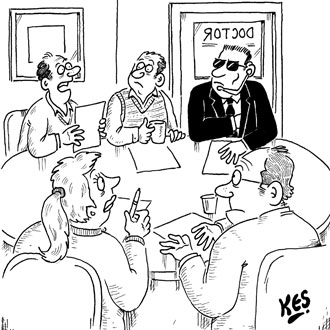As GPs’ workload reaches ever-more ridiculous proportions, a recent startling headline in The Daily Telegraph is brought to Sick Notes’ attention. ‘GPs “could be replaced by under-the-skin sensors”’, proclaimed the paper’s business section, in news that will surely have the powers-that-be at NHS England rubbing their hands with glee. According to Geoff McGrath, vice-president of applied technology at the engineering firm McLaren, small automatic sensors will soon become so sophisticated that they will be able to be embedded under patients’ skin – with patients able to go direct to hospital if anomalies are detected. ‘In Britain we have this notion of a general practitioner, who is almost a filter whose [job is to determine whether] it is worth sending you to a specialist,’ Mr McGrath told an audience in New York. ‘I wouldn’t mind betting that this function will be redundant in the future.’ Expect to spend more time on the golf course imminently then, while an army of under-the-skin sensors gets to work fending off heartsink patients, assessing people for Med-3s and filling in QOF returns.
Spiralling workload and imminent redundancy not withstanding, it turns out that being a doctor is actually a pretty sweet deal – at least according to a new Cabinet Office ‘job satisfaction calculator’. The calculator, which assessed the overall satisfaction of those working in some 274 different occupations, found ‘medical practitioner’ was the seventh most fulfilling career – and, despite the best efforts of the CQC, ‘health care practice manager’ was sixth. Vicars and other clergy topped the list, while publicans and managers of licensed premises came bottom. Journalists, for the record, limped in at number 111.
The message about general practice offering decent job satisfaction may not be filtering down to the next generation though, if a recent 15% drop in GP training applications is anything to go by. So kudos to GPs at the University of Cambridge’s GP Education Group, who have done their bit to battle the current recruitment crisis with a new music video. Their track I’m a GP, a parody of Pharrell Williams’ number-one hit Happy, features a posse of senior doctors shaking their stuff to lyrics celebrating the essence of general practice. ‘It’s never dull/there’s such variety’ should hopefully appeal to those seeking a clinical challenge. ‘No one tells me what to do/And it pays a good sal-ar-y’ ought to cover the rest.
The last edition of Sick Notes celebrated Sir David Nicholson’s refreshingly off-message approach to Twitter, but we always had a sneaking suspicion that the outgoing NHS England chief executive’s flirtation with social media might end in tears. So it came as little surprise last month when Sir David was forced to apologise, on the eve of his retirement, for posting a spoof video apparently depicting care.data head honcho and NHS England colleague Tim Kelsey as, er, Adolf Hitler. The video, the latest in a long line of parodies resubtitling a scene from the film Downfall, was uploaded to YouTube with the title ‘Tim Kelsey discovers that care.data is in trouble’ – and currently boasts 12,000 views and counting. Mr Kelsey’s unimpressed response? ‘My view on the YouTube film: funny but we risk underestimating how important data-sharing is for the NHS. Hitler was no joke.’ Sir David’s apology, inevitably, came in another tweet: ‘Sorry, this is what happens when you give an old bloke with an overdeveloped sense of humour new tech. You’re doing a great job X’. Lol, as they say…
Good news for anti-privatisation campaigners, with justice minister Simon Hughes last month announcing that freedom of information laws will be extended to private firms working on behalf of the taxpayer. Companies will have their FOI obligations written into their contracts after the publication of a new code of practice later this year, we’re told – although whether that will finally stop firms contracted to the NHS hiding behind the shield of ‘commercial confidentiality’ remains to be seen. In the meantime, credit where credit’s due to NHS Isle of Wight CCG, which surely set a new record for speedy transparency by responding to a freedom of information request from Pulse at 9.30am – even though the request had only been submitted at 6.30pm the day before. Even better, they actually provided an informative answer.
Sick Notes is something of a connoisseur of LMC meeting minutes – there are few better ways to keep your finger on the pulse of grassroots GPs. But rarely have we come across a better-minuted meeting than that held by Buckinghamshire County LMC at the Fairford Leys Surgery in Aylesbury on the afternoon of Friday 7 February. The meeting, lasting two hours and 10 minutes, was recorded for posterity across 13 closely typed pages, with the topics covered in exhaustive detail ranging from local QOF deals to GPs’ proper role in booking ambulance transport. The highlight though comes about two-thirds of the way through, when following a discussion about feedback on CQC visits, readers are told with commendable honesty that a ‘general moan about CQC bureaucracy and workload followed’. Perhaps the Cabinet Office should feed that into its job satisfaction calculator…
And finally, if you fancy yourself as a bit of a pundit, then why not enter our GP writing competition? Full details can be found on page 46, and the best pieces will be published in Pulse magazine and online. Good luck.
Pulse October survey
Take our July 2025 survey to potentially win £1.000 worth of tokens














